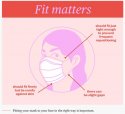Wow / This is a very, very important opening message- I’m half way through the opening remarks for today’s Press Conference / had to come over and post transcript, but better viewed/listened to in person if you can:
Press briefings
WHO Director-General's opening remarks at the media briefing on COVID-19 - 1 July 2020 - Detail
1 July 2020
“Good morning, good afternoon and good evening.
More than 10.3 million cases of COVID-19 have now been reported to WHO, and more than 506,000 deaths.
For the past week, the number of new cases has exceeded 160,000 on every single day.
60% of all cases so far have been reported just in the past month.
We will never get tired of saying that the best way out of this pandemic is to take a comprehensive approach.
Find, isolate, test and care for every case, trace and quarantine every contact, equip and train health workers and educate and empower communities to protect themselves and others.
Not testing alone. Not physical distancing alone. Not contact tracing alone. Not masks alone. Do it all.
Countries that have adopted this comprehensive approach have suppressed transmission and saved lives.
Flare-ups are to be expected as countries start to lift restrictions.
But countries that have the systems in place to apply a comprehensive approach should be able to contain these flare-ups locally and avoid reintroducing widespread restrictions.
However, we are concerned that some countries have not used all the tools at their disposal and have taken a fragmented approach.
These countries face a long, hard road ahead.
But one of the lessons of the pandemic is that no matter what situation a country is in, it can be turned around. It’s never too late.
As you know, in March, Italy and Spain were the epicenter of the pandemic. At the peak of its epidemic, Spain had almost 10,000 cases a day, and Italy had more than 6,500 cases.
But both countries brought their epidemics under control with a combination of leadership, humility, active participation by every member of society, and implementing a comprehensive approach.
Both countries faced a daunting situation, but turned it around.
The fastest way out of this pandemic is to follow the science and do what we know works: the comprehensive approach.
Today and tomorrow, WHO is holding a second research and innovation forum, bringing together more than 1000 scientists from all over the world to take stock of the progress made so far, to discuss new research questions and knowledge gaps, and to define research priorities for the remainder of this year and beyond.
Research and innovation have played a vital role since the beginning of the pandemic – and even before.
In January, WHO published the first protocol for PCR testing for the new coronavirus.
In February, we brought together hundreds of researchers from around the world to identify research priorities.
In March, we launched the Solidarity Trial, a large international study to find answers about which therapeutics are the most effective.
And in April, with the European Commission and multiple other partners we launched the Access to COVID-19 Tools Accelerator, to catalyse the development and equitable allocation of vaccines, diagnostics and therapeutics.
This pandemic is a scientific challenge, but it is also a test of character. We must act in the interests of global solidarity and our shared humanity.
We have a shared responsibility to ensure that all people have access to the tools to protect themselves, especially those who are most at risk.
===
Although the pandemic is global, there are differences in the experience and approach of each region and country.
Over the next few weeks, we plan to feature a different region regularly, to highlight the challenges in different parts of the world, and the lessons we are learning.
Today we’re starting with the Eastern Mediterranean region – comprising much of the Middle East and North Africa – which is the third-most affected region globally, after the Americas and Europe.
Today I’m delighted to be joined by Dr Ahmad Al-Mandhari, WHO’s Regional Director for the Eastern Mediterranean, and Dr Rick Brennan, the Director of the WHO Health Emergencies Programme for the region, to talk about their experience and challenges.
Dr Al-Mandhari and Dr Brennan, welcome to both of you, and thank you for your time today. Dr Al-Mandhari, you have the floor.”

